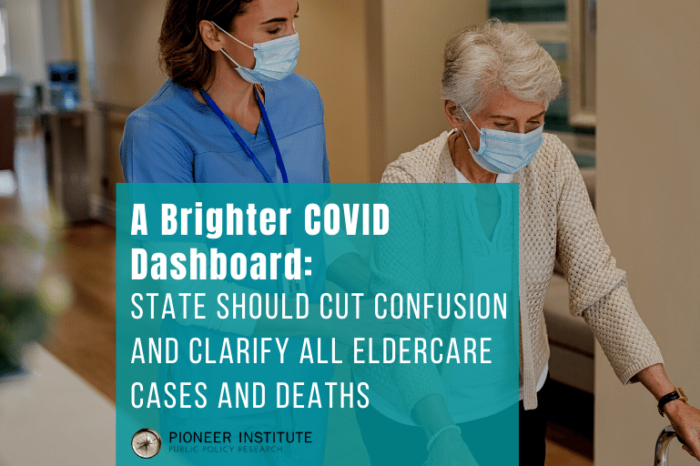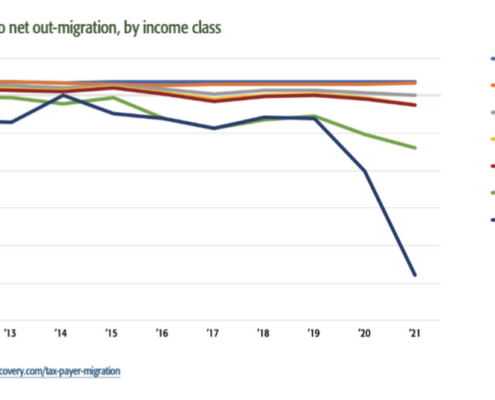Study Calls for Better Reporting on Impact of COVID-19 in Eldercare Facilities
State has made improvements, but more needed
BOSTON – Over time, the Massachusetts Executive Office of Health and Human Services and Department of Public Health (DPH) have improved reporting about cases and deaths from COVID-19 in state-regulated eldercare facilities, but flaws and omissions remain and should be corrected, according to a new study published by Pioneer Institute.
“High mortality rates in Massachusetts eldercare facilities during the pandemic make the availability of clear and complete information on cases and deaths in each of these facilities vitally important,” said Barbara Anthony, co-author of A Brighter COVID Dashboard: State Should Cut Confusion And Clarify All Eldercare Cases and Deaths.
Failure to include all eldercare facilities
The “interactive data dashboard” published by DPH is the most prominent feature on the COVID-19 Response Reporting page of Mass.gov. Its “Higher Ed and LTCF” section used to report total cases and deaths for long-term care facilities, which include nursing homes, rest homes and skilled nursing facilities.
Beginning in December 2020, Pioneer pointed out that the section excluded cases and deaths in assisted living facilities (ALFs), and that the dashboard should include those numbers in order to encompass the full range of state-regulated eldercare. According to an April 2020 WBUR report, the more than 250 ALFs in Massachusetts had 16,500 residents, or around 40 percent of the 38,000 who live in nursing homes and 3,000 in rest homes.
In its April 15 dashboard, DPH continued to exclude ALFs, and in addition stopped including the number of COVID-19 deaths in nursing homes, rest homes and skilled nursing facilities, collectively long-term care facilities (LTCFs). Instead, it included a reference to a sub-section of the COVID-19 “Response Reporting” page, which in turn contains links to complex spreadsheets with hundreds of rows of data.
Conflicting standards produce differing totals
Immediately before the April 15 change, the dashboard reported more than 9,000 total deaths in LTCFs alone, not including ALFs. (There have been over 17,000 COVID-19 deaths statewide.)
However, the state recently eliminated that 9,000-plus figure, and a separate state report cites a total of 6,224 eldercare deaths including those in ALFs – a huge reduction. The state explains that this far lower number is based upon a long-term care-specific Centers for Disease Control and Prevention (CDC) standard that excludes those who recovered from COVID prior to their death (presumably from another cause).
The state should clarify precisely how those many deaths have been excluded from the relevant total, to assure public confidence in the reduction at issue.
Also, the thousands of deaths that have been removed from the calculation of total eldercare deaths appear to remain in the state’s calculation of overall COVID-19 deaths, which – though information is scarce – appears to be based on a more expansive counting methodology. The state’s presentation of different totals using different methodologies obscures an important metric: the proportion of eldercare deaths to overall deaths.
“The report identifies information the state should provide to clarify how it is calculating eldercare deaths, and deaths overall, due to COVID-19,” said David Clancy, who co-authored the Pioneer report. “The public has a right to clear answers about the number of COVID-19 deaths associated with state-regulated eldercare facilities, and how that total relates to the number of overall COVID-19 deaths in the state.”
The COVID-19 Weekly Public Health Report
A section of this DPH report shows the total number of cases and deaths at each LTCF. Until April 15, the section only reported total cases in opaque ranges. The highest was “>30,” even though some facilities have had more than 200 cases.
In accordance with Pioneer recommendations, the section now reports the actual number of total cases, and also provides the number of cases and deaths over the last 14 days.
“This change provides information that is helpful to those trying to decide among long-term care facilities for themselves or a family member,” said Pioneer Executive Director Jim Stergios.
The Weekly Public Health Report also has a companion section for ALFs. Unfortunately, DPH did not change that section to include recent case counts and exact total case counts.
In addition, the ALF section reports no information on deaths, even though hundreds have died at these facilities.
The reporting flaws identified in the report can be readily remedied by administrative or legislative action.
About the Authors
Barbara Anthony, lawyer, economist, and public policy expert, is a Senior Fellow in Healthcare Policy at the Pioneer Institute. She was also a former Senior Fellow and Associate at the Harvard Kennedy School’s Center for Business and Government where she researched and wrote about Massachusetts market reform and healthcare cost containment efforts. She served as Massachusetts Undersecretary of the Office of Consumer Affairs and Business Regulation from 2009 to 2015. Among other positions, Anthony served as the Director of the Northeast Regional Office of the Federal Trade Commission in Manhattan, and was a top deputy to the Massachusetts Attorney General. She began her career as an Antitrust Trial Attorney at the U.S. Justice Department in Washington, D.C. Anthony is a well-known consumer advocate and regularly appears as a media commentator on consumer protection and business regulation issues.
David S. Clancy, a resident of Concord, Massachusetts, is a partner in the law firm Clancy & Shine LLC, which focuses on civil disputes. Mr. Clancy was previously a partner at an international law firm, from which he retired after a 20-year career, also practicing civil litigation. Among other professional activities, Mr. Clancy served three terms on the Board of Editors of the Boston Bar Journal, and has published multiple articles in that and other legal publications.
Pioneer’s mission is to develop and communicate dynamic ideas that advance prosperity and a vibrant civic life in Massachusetts and beyond.
Pioneer’s vision of success is a state and nation where our people can prosper and our society thrive because we enjoy world-class options in education, healthcare, transportation and economic opportunity, and where our government is limited, accountable and transparent.
Pioneer values an America where our citizenry is well-educated and willing to test our beliefs based on facts and the free exchange of ideas, and committed to liberty, personal responsibility, and free enterprise.
Get Our COVID-19 News, Tips & Resources!
Related Content:















